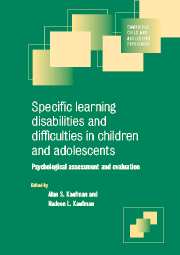 Specific Learning Disabilities and Difficulties in Children and Adolescents
Specific Learning Disabilities and Difficulties in Children and Adolescents from Part III - Neuropsychological Approaches to Learning Disabilities Assessment and Remediation
Published online by Cambridge University Press: 06 January 2010
This chapter deals with two separate, but linked, lines of research. First, is the historic relationship between neuropsychology and learning disability (LD): the accumulating evidence of neurological impairment is reviewed, as well as theories about the role of neurological deficit. Second, the question of subtypes of LD is discussed. Surprisingly, subtype research has, for the most part, proceeded in isolation from the search for a neurological substrate of LD. An attempt is made to show that a convergence of these two types of research may contribute greatly to our knowledge of the field.
The relationship between neuropsychology and LD is built into most definitions. For example, the National Joint Committee on Learning Disabilities (1998) describes LD as a ‘heterogeneous group of disorders manifested by significant difficulties in the acquisition and use of listening, speaking, reading, writing, reasoning, or mathematical skills … These disorders are intrinsic to the individual, presumed to be due to central nervous system dysfunction.’
The stress is on ‘presumed.’ In contrast, detailed descriptions, assessments, and often also treatment protocols have been developed for many childhood disorders of neurological origin, but LD are still based on a presumed neurological origin — the same is true for pervasive developmental disorders and attention deficit hyperactivity disorder (ADHD).
To save this book to your Kindle, first ensure no-reply@cambridge.org is added to your Approved Personal Document E-mail List under your Personal Document Settings on the Manage Your Content and Devices page of your Amazon account. Then enter the ‘name’ part of your Kindle email address below. Find out more about saving to your Kindle.
Note you can select to save to either the @free.kindle.com or @kindle.com variations. ‘@free.kindle.com’ emails are free but can only be saved to your device when it is connected to wi-fi. ‘@kindle.com’ emails can be delivered even when you are not connected to wi-fi, but note that service fees apply.
Find out more about the Kindle Personal Document Service.
To save content items to your account, please confirm that you agree to abide by our usage policies. If this is the first time you use this feature, you will be asked to authorise Cambridge Core to connect with your account. Find out more about saving content to Dropbox.
To save content items to your account, please confirm that you agree to abide by our usage policies. If this is the first time you use this feature, you will be asked to authorise Cambridge Core to connect with your account. Find out more about saving content to Google Drive.